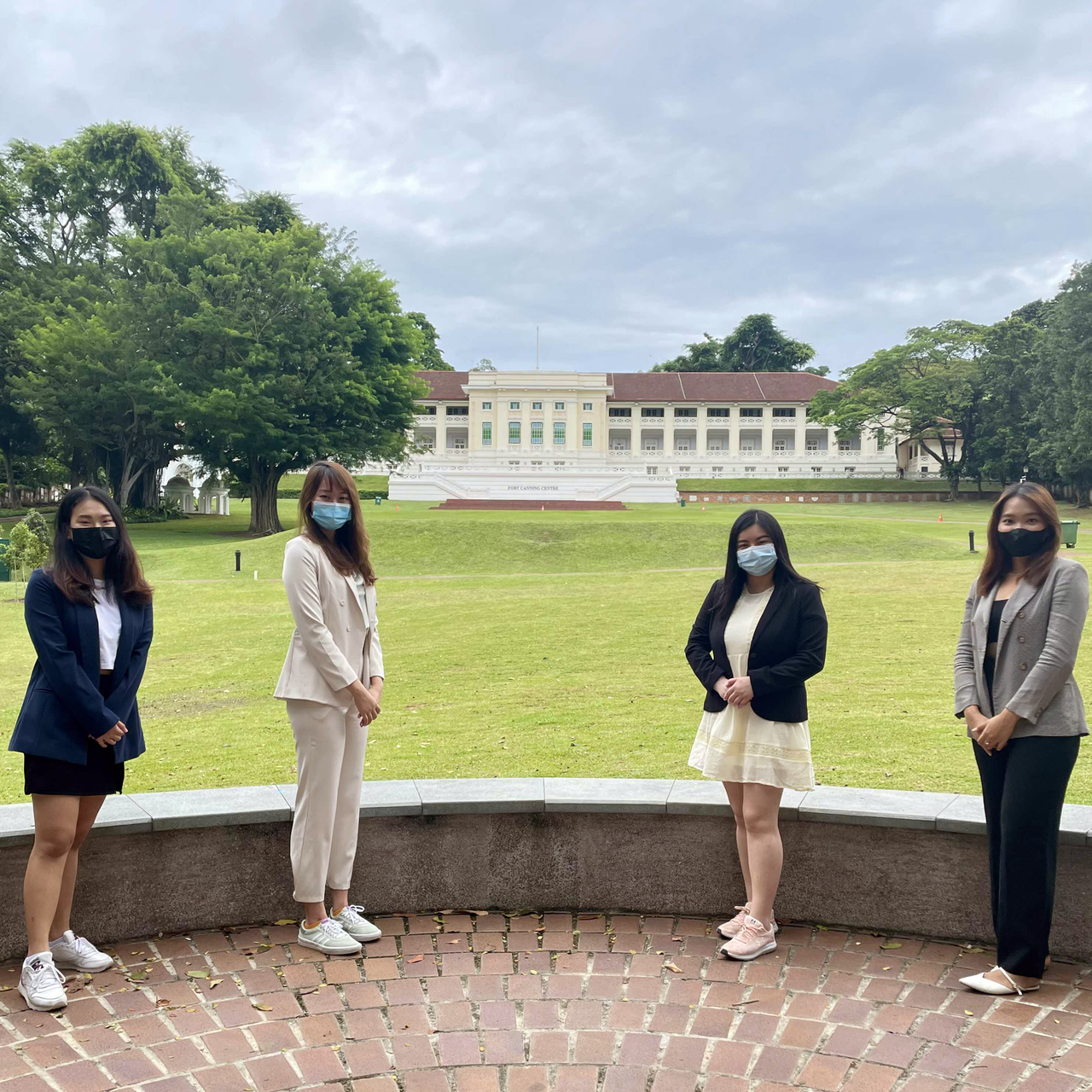Idea for women to watermark their nude photos shared on Telegram with recipients' names wins award at hackathon
Sign up now: Get ST's newsletters delivered to your inbox

(From left) Ms Celeste Ng, Ms Liew Qian Hui, Ms Lee Xin Yi and Ms Exceline Angelia Darmawan won the most innovative award for their proposal at the hackathon.
PHOTO: GO WOMEN
SINGAPORE - A team of four Singapore Management University (SMU) students proposed that a feature be set up on messaging app Telegram to allow women to watermark their nude photos with the recipient's name, so as to deter mass forwarding of the photos.
They also suggested an anti-forwarding technology to be implemented on the app to prevent immediate leaks of intimate or nude photos.
Their team was one of the four winners of Hackathon for a Better World. The theme for this year's competition was tackling online harms, especially against women and girls.
Speaking at the virtual awards ceremony on Thursday (Oct 28), Minister of State for Communications and Information Tan Kiat How said: "The risk of exposure to online harms and threats have increased significantly, especially in the new normal of learning, working and socialising from home.
"The Government cannot tackle this issue alone. Events such as this hackathon are an important avenue to bring together like-minded individuals from all walks of lives... to tackle online harms."
Organised by DBS Bank, the Singapore judiciary and the Ministry of Communications and Information, the hackathon saw 28 teams come up with solutions to foster a safer online space for women and girls over a two-month period from July 21.
The four SMU students in team Go Women, whose proposal won the Most Innovative Idea Award, said they joined the hackathon to help women who were victims of leaked nude photos and to prevent such leaks from happening to others.
The now-defunct SG Nasi Lemak chat group on Telegram, which hosted obscene photos and videos - some of Singapore women - was a "push factor" in the team's decision to create solutions to prevent sexual crimes online.
The group had 44,000 members at its peak. One of the administrators of the group was fined and jailed this year, while another man was given a mandatory treatment order. Two youths were given probation over their involvement.
Go Women team member Liew Qian Hui, 20, said: "Seeing Telegram groups abused in this way is a very clear indication that there are not enough safety measures to protect women who may be vulnerable online."
Another team member, Ms Celeste Ng, 20, said: "As young women, we can't help but think, what if one day that happens to us or our friends?"
Ms Ng, Ms Liew and teammate Exceline Darmawan, 20, are in their second year at law school. The fourth member, Ms Lee Xin Yi, 21, is a third-year law and business undergraduate.
One of the key solutions proposed by the team is for an artificial intelligence (AI) identification and blurring mechanism to be implemented on Telegram.
The team explained that the AI should be able to recognise nudity, and once that has been detected, identifying facial features of the women should be made obscure.
Women may send nude photos to show off their bodies, while some may have been coerced to do so, the team said.
Ms Lee said: "Ultimately, we hope to deter people from leaking or spreading nude photos. If potential perpetrators feel that they may be caught or if the nude photos can be easily traced back to them, they may think twice about forwarding a woman's nude photos."
The students told The Straits Times that they will remain passionate about the cause and hope to take on pro bono work to help victims of online sexual crimes after they graduate.
Winning the Most Human-Centred Award was team Pin It Down, whose idea entailed offering mental health support to the partners of perpetrators of technology-facilitated sexual violence such as grooming or sexual harassment via social media campaigns and collaborations with agencies.
The award for most feasible idea went to a team from law firm Shook Lin & Bok, which proposed to help victims of image-based sexual abuse via public education and clinics to provide them with legal, psychological and technological assistance.
A team from the State Courts won the Most Life-changing Idea Award for its solutions to help women whose photos have received lewd comments on social media.
Their solutions include a "cybertogether hub" where users can report incidents of cyber bullying or speak to live chat agents.
The winning teams each won $1,000 in shopping vouchers.
High Court Judge Aedit Abdullah, who was a guest of honour at the event, said: "Online harm is an area of great concern, affecting the lives of many, especially the young. To be attacked online is frightening and debilitating.
"It is thus timely for the hackathon this year to focus on online harms, promoting the development of solutions to protect against or prevent these harms."
Mr Lam Chee Kin, group head of legal, compliance and secretariat at DBS, said: "Having a wealth of good ideas emerge from the hackathon... is a fine example of how public-private-people partnerships can yield productive outcomes that benefit the broader community."


